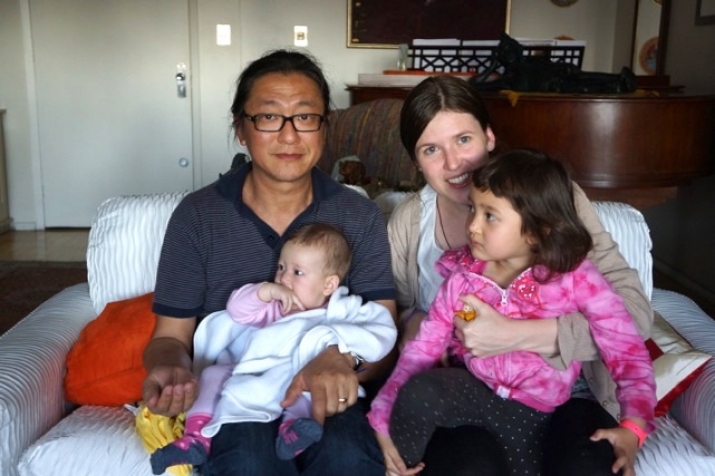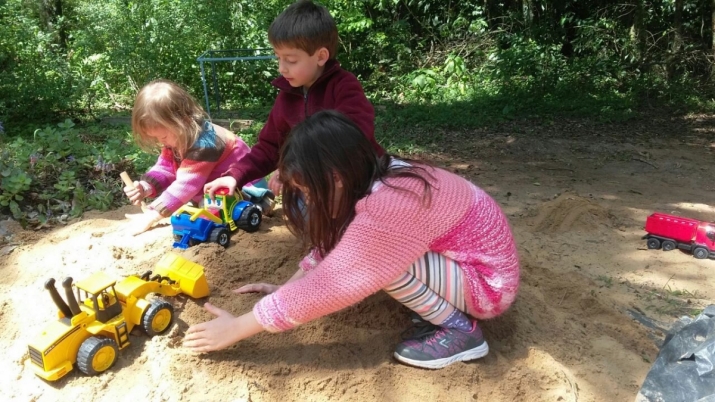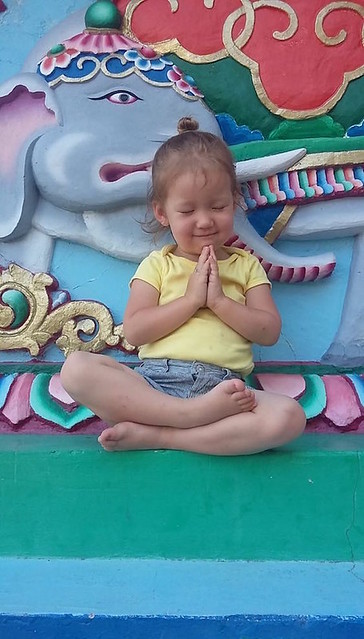FEATURES|COLUMNS|Buddhist Parenting (inactive)
Working with Attachment and Family
 Image courtesy of the author
Image courtesy of the authorBeing separated from my daughters is not easy, but sometimes it is necessary to have some time away without feeling guilty. I am currently traveling without my family to attend a retreat. My husband and I explained to our two daughters during the days prior that mommy would travel first and then they would come to join me. All of us felt prepared, but when the taxi finally arrived they both looked at me holding my bag and tears welled up, rolling down their cheeks. I had to hide my own tears as I entered the taxi. Driving down the road to the Gonpa gate I realized that I had forgotten my phone charger and needed to return to the house. When I arrived back at the door, I could see that the tears had already passed and that everyone was fine. The driver and I set out once again for the airport and my heart felt lighter.
At the airport I saw small children carrying colorful travel gear and had to look away to avoid becoming teary again. This has happened before when I have traveled alone to participate in other retreats. After weeks of longing for some time alone—a little space to assess my mind while sitting quietly—finally having that time I seem to suffer more than the children from the separation, afflicted with constant concerns that are mostly imagined. A mother’s imagination seems unstoppable. “What if there is an accident? “What if . . . ?” There is also a kind of physical heartache from being away from the children, a feeling that something is missing.
I am a mother who favored co-sleeping and breastfeeding (when possible). I believe that keeping our children close to us when they are young helps them become more secure later. However, even as a committed mother, it is evident that I need to make space for short retreats when conditions allow. In most Buddhist lineages there is a tradition of going into retreat, where we create a boundary to diminish outer distractions and dedicate time for meditation and prayer. When we have a family it is harder to create the conditions to dedicate an extended length of time in this way, but even an afternoon or a weekend can be so helpful. Buddhism is not just for monastics, or those who can dedicate years and years to meditation. The Buddha taught 84,000 methods to communicate the Dharma to the countless different types of people. I find that applying the methods I have learned, such as mind training, in my daily life is essential, but I also have to top up my inspiration and deepen my learning with retreats. Even a short, intensive retreat can have transformative results. Yet it feels that for a parent to attend a diligent weekend retreat requires the same discipline and effort that another person would exert for a much longer period away.
I am very fortunate to have the support of a sangha of lay practitioners who help my husband and children if I am away. Having the support of a community of people who hold the same values helps to reinforce our common sense of Buddhist ethics, such as the vow not to harm others. In earlier times, families would live together, with grandmothers, grandfathers, aunties, and uncles on hand to help with smaller children. I think there are still places in the world were many generations of a family live together and support one other, unlike in the West, where most families live as more isolated units. It seems very healthy for children to bond with their grandparents and spend time with aunts and uncles. Living in a Buddhist community is like having a large extended family with many aunts and uncles, and this also makes it easier for me to make the time for a retreat.
Since becoming a parent I have tried to include my children in all aspects of my life. My first daughter traveled widely with me when she was little, attending teachings and transmissions. She would play for hours inside the temple or in the temple courtyard while I volunteered and practiced during ceremonies. My husband and I even took her to Bodh Gaya, the place of the Buddha’s enlightenment, when she was a baby. She also accompanied me for three months to listen to an oral transmission and teaching in India before she started going to school. Now with two children it is more challenging. When one child has settled in the temple or shrine room, the other wants to go to the bathroom, or they become noisy playing together. I found myself participating in fewer retreats and ceremonies, and find that it is easy to feel overwhelmed and lose inspiration for formal sitting.
Just as our little children flourish and recharge from quiet time, I think mothers and fathers also need to respect their own need for quiet time. I have a good friend who is also a mother of small children. Sometimes she gently reminds me, “In the airplane we are advised to put on our own oxygen mask first, so we will be able to help others.” Earlier this year, my husband went on a pilgrimage to holy sites in China and I managed at home with the children. Now he is supporting me to attend a retreat. We make a conscious effort to support each other’s path, knowing that the spiritual growth of the other will bring benefits to the whole family and hopefully to others also.
Becoming a parent opens the door to unconditional love, but it also increases our attachments. The intense attachment we feel for our children, overtly and unconsciously, can influence many decisions, but sometimes I have to take a hard look at my attachment and make room for some healthy separation. Unfortunately, we often undermine how incredibly intelligent and sensitive children are. On one occasion, I was explaining a situation to Amaya when she was about four, when she interrupted me: “Mom, I know this already! When you talk to other people I hear too, and then I know what I’ve heard.” I felt ashamed and apologized. Sometimes adults speak thinking that children are not listening or paying attention, but in fact they are absorbing everything.
 Image courtesy of the author
Image courtesy of the authorEven though Leela is still small, I spoke to her about taking some days away and she seemed to understand fully when I explained with care and detail. Since the initial teary departure I have received a collection of silly and loving WhatsApp messages from both daughters, and daily snapshots from family and friends showing that the children are well. I hope that we can all benefit from becoming used to separation in small doses and confronting my attachment. Even though it can be mixed with love, attachment is fundamentally bound to bring suffering. The Buddhist understanding of love is wishing the other happiness. Wishing our children and all beings happiness and the causes for happiness transcends selfish attachments. Giving myself the space to reflect on this kind of love in retreat helps me to parent with less selfish attachment and more genuine love.















